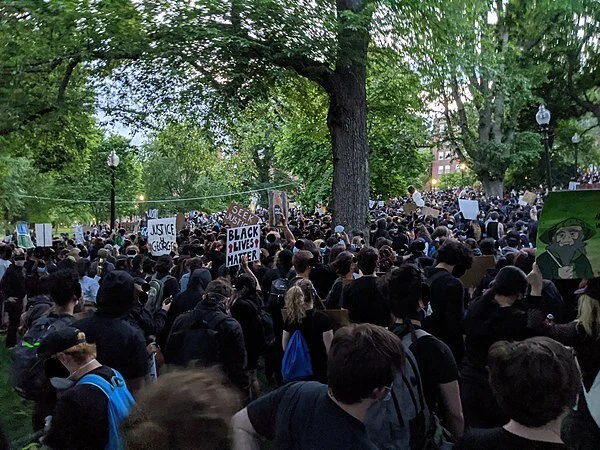Sara Jean-Francois: Attacks on Critical Race Theory suppress racial liberation and free speech
Rally on the Boston Common on May 31, 2020 after the murder of George Floyd
From The New England Journal of Higher Education, a service of The New England Board of Higher Education (nebhe.org)
BOSTON
When I was in elementary school, history happened like this: The world was fighting, the Civil War happened, Abraham Lincoln freed the slaves and then everything was happy and free, and the U.S. was the place to be. Now obviously that is a gross exaggeration of the facts. But it’s not untrue about what we as role models, educators, parents and guardians chose to disclose to children about the historical legacy of race and, thus racism, in the U.S.
As a Black girl growing up in a wide variety of neighborhoods, but almost always attending a predominantly Black and ethnically diverse school, it strikes me as inherently odd that even as K-12 schools and higher education begin to educate an increasingly diverse set of students, we can simultaneously remain complicit in the concealment of history as it is, not as we have decided to rewrite it.
Last year, shortly after the murder of George Floyd, Ahmaud Arbery and so many others, it seemed as if the world had finally opened their eyes to the everyday reality and fears of Black America. And yet, just after the anniversary of these murders, we see state legislation in the headlines of various news sites attacking Critical Race Theory (CRT) and actually proposing legislation that would ban teaching history, as it is commonly accepted to be true. We cannot deny that woven into the narrative of U.S history is the history of systemic racism and other oppressions.
“Divisive” concepts?
Many have coined the term “divisive teaching” to describe teaching from what would be considered a culturally relevant and historically accurate account of race and racism in the U.S.
In Iowa, legislation has been passed that would explicitly forbid teaching of systemic racism or sexism. And Iowa is not alone. Earlier this year, Oklahoma banned CRT, causing a chain reaction of lost course offerings for students who want to learn about the true history of race in the U.S. In New England, the New Hampshire legislators approved a bill that would ban the teaching of “divisive concepts,” including topics of inherent racism, sexism or oppression, whether consciously or unconsciously. (Similar bills have been introduced in Maine and Rhode Island.)
The Iowa, New Hampshire and Oklahoma legislation attack the discussion of systemic racism head-on, leaving the potential for an entire generation of young people to grow up with the same implicit bias, bigotry and stereotypes that have led to the death of so many Black Bodies already, including George Floyd. They are just three examples of how legislative attacks on Critical Race Theory are directly trying to use politics to attack racial progression. It raises the question, will there ever be a post-racial society?
For the past year, as so much of the world shouted “Black Lives Matter,” whether at protests, through statements of solidarity, posting little black boxes on Instagram, T-shirts, or supporting Black-owned businesses, we all felt the weight of racism in the air. We saw how racism breeds real-life consequences, and for Black people, that can mean death.
Yet here we are, concerned with the state of academic freedom, rather than about what it means for the future generation of Black bodies in the U.S. Somewhat ironically, news reports about these pieces of legislation follow the official national recognition of Juneteenth as a federal holiday. This irony begs the question: Is America moving forward toward a more racially equitable society or is performative politics the new norm as we face yet another inflection point in history?
What about antiracism?
If states are allowed to ban an entire body of research, theories and the models and pedagogy that come from this work (already left out of everyday teachings) how can the U.S. claim we learned anything about “antiracism” in the past year?
How can higher claim to care about Black life, when academic freedom is considered far more sacred? The anti-CRT legislation undoubtedly will uphold the inherently white-centric teachings that have been established as our common educational standard. The historical and present relationship that the U.S has with racism, and other oppressions within and outside higher education, seems to be more protected and guarded than the Black lives that are constantly being attacked and killed.
Bell hooks posits that “education is a practice of freedom” and yet education and, thus the freedom it gives everyone, not just Black people, is also being attacked. Who will suffer the most? And so I ask, Why did George Floyd become martyr to a cause nobody is listening to anymore?
If you ask me, the aforementioned anti-CRT legislation is not only an attack on academia and free speech, but also a direct suppression of racial liberation and consequently any racial progression moving forward. It is time that politicians, activists and educators alike take a divisive and definitive stance and decide whether the academy, and whether this democracy, will follow a path of antiracism or continue to be passively racist.
Sara Jean-Francois is assistant director of NEBHE’s Regional Student Program, Tuition Break. She recently earned her master’s degree in public policy from Brandeis University’s Heller School for Social Policy and Management, where she conducted significant research on race-conscious campuses and issues of equity and inclusion within higher-education policy.
